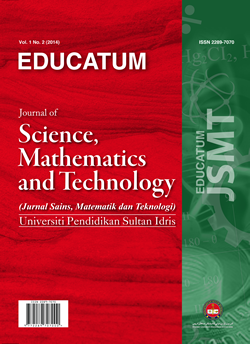Development and Content Validation of Modular Textbook on Mathematics in the Modern World at Sorsogon State University, Sorsogon, Philippines
DOI:
https://doi.org/10.37134/ejsmt.vol11.1.5.2024Keywords:
development, content validation, modular textbook, Mathematics in the Modern WorldAbstract
Modular textbooks are widely recognized as a valuable resource for teaching mathematics in schools and colleges. This descriptive-developmental research aimed to provide a research-based modular textbooks for course Mathematics in the Modern World. Difficulties encountered in mathematics by 100 Grade 11 students from three public secondary schools in Magallanes, Sorsogon were identified along with the prescribed topics and competencies by CHEd as inputs on the development of the textbook. As a result, the developed textbook is consisting of 21 modules since 7 units of 3 lessons and each module is divided into 10 parts. Modules related to proofs, logic and functions as the top 3 difficult key concepts were given more emphasis in terms of examples and activities to be included. Five experts who are teachers that have experienced teaching MMW have evaluated the textbook in terms of design, format, and OBE alignment. It was found out that the textbook is very satisfactory with a weighted mean of 4.29 as assessed by the evaluators through the use of adopted instrument. With these findings, researchers and educators should consider developing modular textbooks that are tailored to the needs and interests of students, with a focus on enhancing their problem-solving skills and critical thinking abilities. The modular textbook should be extensively validated before they are used in classrooms, and that the validation process should be ongoing, with regular reevaluation and revision of the textbooks to ensure that they remain relevant and effective.
Downloads
References
Algani, Y. (2022). Role, need and benefits of mathematics in the development of society. Journal for the Mathematics Education and Teaching Practices, 3(1), 23-29. Retrieved from: https://dergipark.org.tr/en/download/article-file/2482784
Center for Curriculum Redesign. (2021). Mathematics for the Modern World: Standards for a Mathematically Literate Society. Retrieved from: https://curriculumredesign.org/wp-content/uploads/Mathematics-for-the-Modern-World.pdf
Bature, I. J. (2020). The Mathematics teachers shift from the traditional teacher-centred classroom to a more constructivist student-centred epistemology. Open Access Library Journal, Vol.7 No.5. Retrieved from: https://www.scirp.org/journal/paperinformation.aspx?paperid=100486
Koskinen, R. and Pitkäniemi , H. (2022). Meaningful learning in mathematics: a research synthesis of teaching approaches. International Electronic Journal of Mathematics Education 2022, Vol. 17(2), Retrieved from: https://files.eric.ed.gov/fulltext/EJ1336141.pdf
Mithans, M. and Grmek , M. (2020). The use of textbooks in the teaching-learning process Retrieved from: https://www.researchgate.net/publication/342641993_
Kristanto, Y. and Santoso, E. (2019). Towards a mathematics textbook for supporting 21st century learning: The student perspective. Journal of Physics: Conference Series Retrieved from: https://files.eric.ed.gov/fulltext/ED610046.pdf
Mupa, P. and Chinooneka , T. (2015), Factors contributing to ineffective teaching and learning in primary schools: Why are schools in decadence? . Journal of Education and Practice Vol.6, No.10. Retrieved from: https://files.eric.ed.gov/fulltext/EJ1079543.pdf
Hasibuan, A. et al. (2019). Development of learning materials based on realistic mathematics education to improve problem solving ability and student learning independence, International Electronic Journal of Mathematics Education E-Issn: 1306-3030. Vol. 14, No. 1 Retrieved from: https://files.eric.ed.gov/fulltext/EJ1227202.pdf
Abramovich, S. (2019). Teaching mathematics through concept motivation and action learning. Retrieved from: https://www.hindawi.com/journals/edri/2019/3745406/
Mazana, M. et al. (2019). Investigating Students’ Attitude towards Learning Mathematics International Electronic Journal of Mathematics Education E-Issn: 1306-3030, Vol. 14, No. 1. Retrieved from: https://files.eric.ed.gov/fulltext/EJ1227188.pdf
Ghazali, N. (2016). A reliability and validity of an instrument to evaluate the school-based assessment system: a pilot study Nor Hasnida Md International Journal of Evaluation and Research in Education (IJERE) Vol.5, No.2.Retrieved from: https://files.eric.ed.gov/fulltext/EJ1108537.pdf
Refugio, C. (2020). Difficulties in teaching senior high school General Mathematics: Basis for training design. Cypriot Journal of Educational Sciences, Volume 15, Issue 2. Retrieved from: https://www.researchgate.net/publication/341158630_Difficulties_in_teaching_senior_high_school_General_Mathematics_Basis_for_training_design
Alelaimat, A. (2017). The effect of educational modules strategy on the direct and postponed study's achievement of seventh primary grade students in science, in comparison with the conventional approach. Higher Education Studies, Vol. 2, No. 2. Retrieved from: https://files.eric.ed.gov/fulltext/EJ1081470.pdf
Ramdani, R., et al. (2019). Development of mathematical module-problem solving approach to train student’s reflective thinking. Pedagogical Research 2019, 4(4). Retrieved from: https://files.eric.ed.gov/fulltext/EJ1244078.pdf
Columbano, M. (2019). Development and validation of modules in basic mathematics to enhance students’ mathematics performance. International Journal of Innovative Technology and Exploring Engineering (IJITEE), Volume-8 Issue-12. Retrieved from: https://www.ijitee.org/wp-content/uploads/papers/v8i12/L2684108 1219.pdf
Downloads
Published
Issue
Section
License
Copyright (c) 2024 Franklin Calaminos

This work is licensed under a Creative Commons Attribution-NonCommercial-ShareAlike 4.0 International License.





